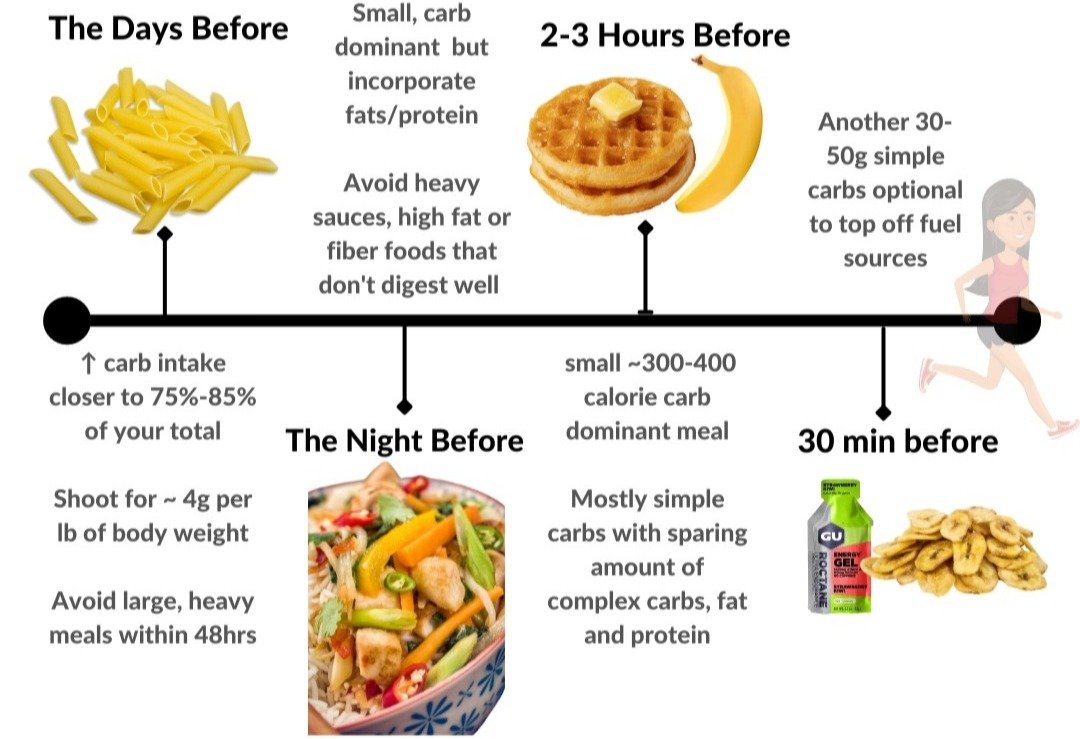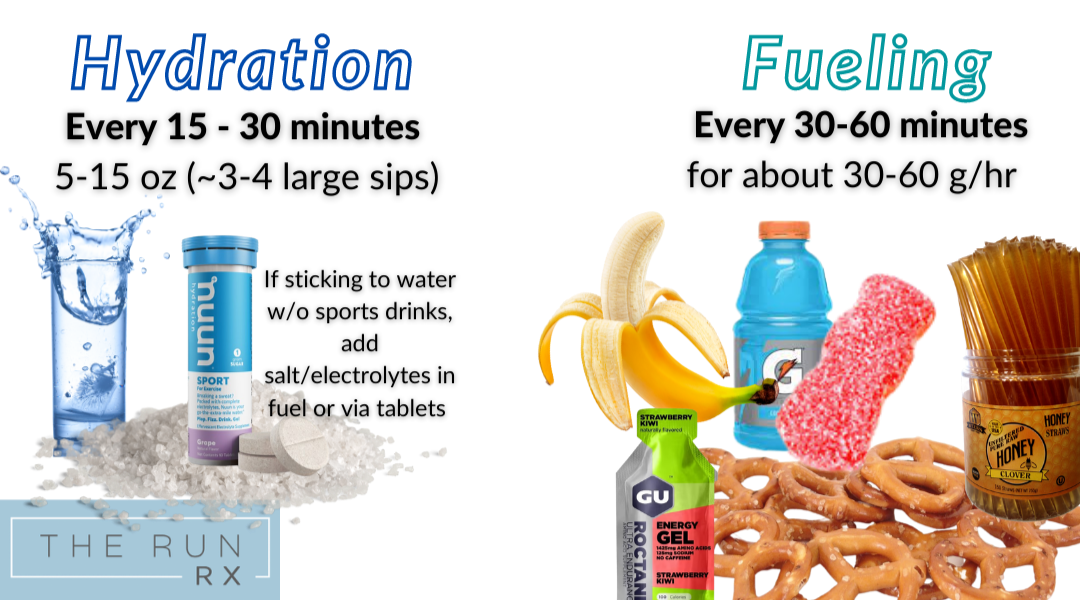Guide to Fueling and Hydrating for Runners
As a runner, in particular a marathoner, food is far more than simple nutrition. Food is what fuels your engine in training and on race day. When understood and executed properly it can be a major piece to your next PR.
A baseline understanding of how and what your body uses for fuel is important for runners to be able to really optimize this component of performance. So let this be the blog to end all googling of "how to fuel for a marathon". Let's simplify the process so you can be a more educated consumer/runner and apply it for optimal performance.
The Science of Fuel
Your Body's Fuel Verbiage
Glucose = the simplest unit of energy used, a simple sugar that circulates in the blood where we most easily access it for energy
When not utilized, it is stored as Glycogen in the muscle and liver
Moderate intensity activity over just 20 min will tap out blood glucose requiring breakdown of stored glycogen
When glycogen runs out, we begin utilizing fat and protein which is less efficient for energy production and causes breakdown and injury
Talk to me in food language...
Carbohydrates provide the simplest/most accessible glucose. They are the ultimate nutrient for runners because an active body prefers them as a fuel source.
Fats can also provide high amounts of energy for long efforts at a lower intensity but require more steps to be broken down for use. Healthy fats helps runners meet high-calorie needs from small portions of food.
Protein is not an ideal fuel source but vital for it's role in muscle repair and strength to prevent breakdown and injury
Eat To Support Good General Health
Providing insufficient nutrients in the form of restricted diets is highly discouraged for runners whether it is caloric restriction or elimination of a nutrient. Females are especially at risk for bone stress injury and the female athlete triad.
Restriction of any food groups can result in a deficit in important nutrients that keep you healthy. A few of the most important ones for runners:
Calcium & Vitamin D - Vital to bone health and if lacking it places runners at HIGH risk of bone stress injury. Dairy products & leafy greens.
Iron - iron supplies oxygen in blood for energy production. Red meat, fortified grains and beans.
B Vitamins & Zinc - energy metabolism & tissue repair. Whole grains & meat
Do your best to get these from foods and if lacking, find supplementatio
A Guide to Timing and Event Fueling
Grasping the timing on how your body moves through this process is vitally important. This way you can gauge when the food you're consuming is going to be used.
The ultimate goal = provide short and long term fuel while limiting time actively digesting complex foods during performance.
With this goal in mind, Glycemic Index is a good thing to be familiar with. It puts carbohydrates on a scale of how quickly they're broken down into usable glucose, and can be used to give you an idea of how to time fueling around a race or workout.
A Timeline Example
Event is in 2.5 hours, you want mostly carbs for quick access to fuel, but throwing a small scoop of peanut butter on a banana can provide some staying power. As that banana is used up early in your run, the fats, proteins and complex carbs from the peanut butter are just becoming available in your blood stream as a backup push.
30 min before, proteins, fats and fiber will be digesting for a couple hours pulling energy from your muscles to your gut. Stick to something high on that glycemic chart like a gel or sports drink which will be immediate glucose in your bloodstream
90 min in, you've depleted glycogen stores. Again, you won't want to put a lot of digestion on your body. So look for more simple carbs to reload that bloodstream.
Before the Race
Carb intake should increase in the 5-6 days before your event closer to 75+%. Meals furthest from your run can be more complex with some healthy fats, fiber and protein, but as you get closer shift more toward simple carbs and avoid heavy meals The hours before the race are to top off that glycogen tank and provide immediate-use blood glucose without actively digesting anything as the gun goes off.
During the Race
Glycogen is tapped around 90 minutes and you've lost some fluid in sweat. You should begin fueling and hydrating around 60 minutes. A few sips of fluid every 15-30 minutes as tolerated depending on how much you sweat. You can measure your sweat rate to get a more specific amount needed for your body. IF you're going with water make sure you're getting some electrolytes from a tablet like Nuun or mix in a little gatorade or salty pretzels in your fuel.
Fueling should be about 30-60 g/hr based on your size and tolerance to fueling in training runs. If you tolerate this better it can be broken into smaller amounts every 30 minutes. Your body is using sugar rapidly at this point. So whether it's candy, gels or more natural food options like bananas or pretzels, give your body simple carbs it can use immediately in small doses. For reference, ~ 40g of simple carbs looks like ~20 sour patch kids.
After the Run
After a workout or race it's important to provide your body what it needs to reload and recover. Immediately after training, there is a window of time where your body is more anabolic-ly inclined to rebuild muscle and most susceptible to uptake and maximizing of glycogen stores. Your snack within 30 minutes after should be balanced. That means both simple and complex carbs for immediate access + prolonged absorption and re-uptake of glycogen stores. Some protein to supply your muscles demand for repair and healthy fats to provide calories lost from a hard push. A few hours later follow it with a full well-rounded meal.
Try a PB & J...the perfect combo of all of these
Jelly = simple carbs
Whole wheat bread = complex carbs
Peanut Butter = protein and fats
Odds & Ends
Hydration
Proper hydration efforts can feel like a big commitment. It's important to continuously hydrate throughout the day because when your body tells you it's thirsty, you're already dehydrated. Sweat rate is the most accurate way of assessing how much you need to hydrate during and after a workout. If you weigh yourself before and after a workout and you've lost notable weight, you're not hydrating enough. That can get complicated though so follow the general guidelines below and always practice and experiment to see how your body feels.
Caffeine
One of the most widely used drugs in the world, caffeine has been used as a performance enhancer for over 30 years and one of the few used equally by endurance and anaerobic
athletes alike. It must be utilized wisely to fall in the optimal performance range. We've all felt how the right dose of coffee gets us ready for a task or workout. You've probably also felt the effects of one too many cups . The arousal-performance curve shows that with mental arousal performance improves, to a point. Beyond this point leads to ⬇️ performance due to excessive restlessness and anxiety. And of course, 💩
HOW IT HELPS
⛽Prolongs aerobic endurance by ⬆️ use of fat for fuel
🍬Slowed glycogen depletion delays fatigue
🔌Improved power production through ⬆️ excitation-contraction coupling and neuromuscular transmission
🧠As a stimulant, it makes you more alert and increases arousal for ⬆️ performance
APPLICATION
▪️A cup of coffee 1 hour before your workout is the recommended dosage.
▪️Consider your GI system and how sugar/cream may affect it. Black is always the best option
▪️Caffeine is a diuretic, make sure to hydrate. Especially when exercising in the heat
Remember to practice/experiment with everything BEFORE race day! Including fluid intake and different types of foods. Have your game plan solid at the start line and nail it.









